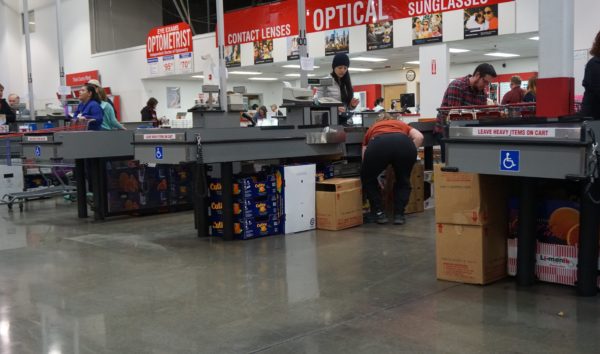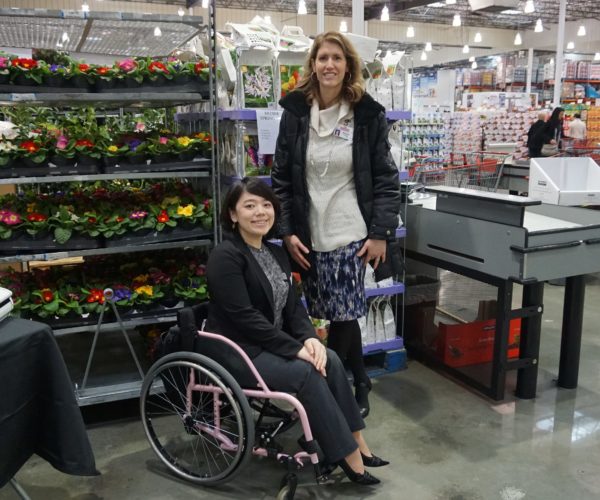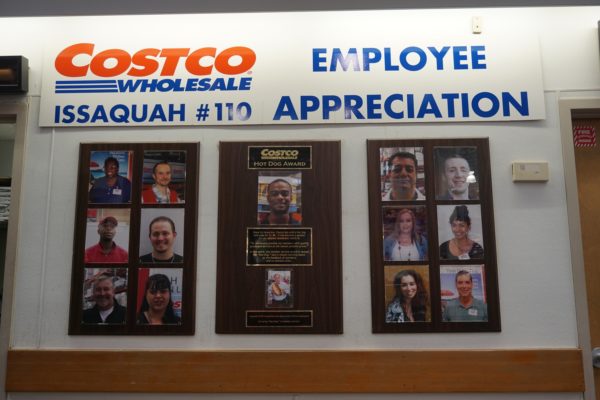This article is also available in: 日本語
*** Part 1 is here ***

At its warehouses, Costco offers assistance to its members (customers) who might have a disability preventing them from reaching the higher shelves. Once a member requests assistance, an employee will be assigned to walk with the customer to help them with their shopping. Since each warehouse is huge and some products are stacked tall, it could be difficult for some people in a wheelchair or with other disabilities to shop by themselves. By supporting its members this way, more customers are able to enjoy shopping and spending their time effectively at Costco. The warehouse also has a special shopping cart which can be attached to a wheelchair.
American shopping carts are 2 or 3 times bigger than Japanese one. (Average product sizes in the U.S. are bigger too.) This attachable cart is very useful because it’s hard to control a wheelchair and a big shopping cart at the same time. Also, all check-out stands are accessible to wheelchair users.

Brenda said,
Our goal is really making sure we are constantly communicating with our employees. We are encouraging behaviors of inclusion. Because we are a very diverse company already, it is a matter of continuing that rich diversity and being sensitive to our employees needs.

Through my observation at the warehouse, I found that Costco has created an inclusive working environment where people from different background can work together. In Japan, many positions that require you to serve customers or people from outside of the company in a face-to-face situation are still not open for people with disabilities. I wonder why. Do employers in Japan think that people with disabilities cannot do customer service face-to-face? Or do employers think that it is embarrassing to show employees with disabilities to their customers? Or both?
In some business fields such as retail or food industries, the majority of positions would require you to serve customers directly. To promote hiring people with disabilities in those industries, I believe that Costco’s job analysis is very helpful. Right now, many companies in Japan offer limited information regarding the necessary qualifications that might result in more applicants with disabilities. However, to avoid misunderstandings or low expectations between employers and applicants with disabilities, employers should provide a more detailed document that explains the abilities needed to work in the position. A few of these types of qualifications might get more applicants, but it doesn’t mean they all can do the job as the employer expects. If employers pay the same amount of salary, you would need an employee who can meet the job expectations. Employment for people with disability is not a company’s volunteer work.

Employers should not assume that people with disabilities cannot work in a certain position which requires face-to-face customer service, but make the qualifications clearer and more detailed. Applicants with disabilities should make sure that they meet those job requirements with or without accommodations. If any accommodation is needed, do consult with the employer.
Remember, a new law, “Act on the Elimination of Disability Discrimination“is now effective in Japan. It includes providing reasonable accommodation in employment. I am sure that people with disabilities are no longer rare people. If more people with disabilities work in the frontline, more people would see employees with disabilities working professionally in public. It would help those employees expand their abilities to build a better career. It would also have a huge impact on kids with disabilities and their families because they can dream about the various kinds of jobs that the kids can challenge themselves to perform in the future. Beyond this generation, we together should make a society without limitation!
